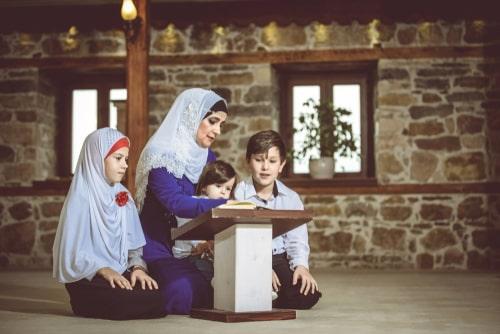Recent Blog Posts
Can I Continue to Raise My Children According to the Tenets of Islam After the Divorce?
 Divorce for Muslims in DuPage County can be extremely complicated, especially when there are questions about how Islamic law will apply to the divorce proceeding and the steps that must be taken to obtain an Islamic divorce certificate in addition to a civil divorce decree. One issue that is not especially common but can arise in a Muslim divorce is this: the spouses have minor children from the marriage, and one of the parents is less religious than the other and wants to move away from raising the children in a religious environment. In other words, one of the parents wants to move away from educating the children according to the beliefs and practices of Islam, but the other parent vehemently disagrees. If you are the other parent—the parent who believes in a strong religious upbringing for your children—you are likely concerned and want to know: Can I continue to raise my children according to the teachings of Islam after the divorce?
Divorce for Muslims in DuPage County can be extremely complicated, especially when there are questions about how Islamic law will apply to the divorce proceeding and the steps that must be taken to obtain an Islamic divorce certificate in addition to a civil divorce decree. One issue that is not especially common but can arise in a Muslim divorce is this: the spouses have minor children from the marriage, and one of the parents is less religious than the other and wants to move away from raising the children in a religious environment. In other words, one of the parents wants to move away from educating the children according to the beliefs and practices of Islam, but the other parent vehemently disagrees. If you are the other parent—the parent who believes in a strong religious upbringing for your children—you are likely concerned and want to know: Can I continue to raise my children according to the teachings of Islam after the divorce?
Possible Complications in Muslim Divorces
Divorce is complicated and difficult for any family going through this process. Indeed, whether you have only been married for a short time and have no children from the marriage, or have been married for years and still have minor children together, divorce in DuPage County is never easy emotionally or financially. Yet Muslims in DuPage County who are thinking about Islamic divorce may need to consider additional complications. Divorces involving Shariah, or Islamic law, can make the process more complex, especially when the spouses were married outside the U.S. and are now seeking a divorce within the country. Approximately one out of every three Muslim marriages in America result in divorce. This number is lower than the national U.S. average, but it is still a sufficiently high percentage that necessitates additional thinking about Muslim divorces in America.
In the meantime, if you have questions about filing for divorce or how to handle complications for Muslims, an experienced DuPage County divorce lawyer at Farooqi & Husain Law Office can help you. We have years of experience serving the DuPage County Muslim community with a wide variety of family law matters.
My Employer is Requiring Me to Relocate: How Will This Affect Child Custody?
 Imagine that, in the new year, your employer informs you that you will need to relocate for your job. You may be excited about the opportunity for a promotion, but you may also be worried about child custody and how your relocation will affect your parenting time responsibilities. The answer depends on a number of different factors, including where your boss wants you to relocate and how far it is from your current location. If you have questions about child custody and relocating for a new job, you should seek advice from an experienced DuPage County child custody attorney. In the meantime, here is some additional information that may be able to help you understand how a move can impact child custody.
Imagine that, in the new year, your employer informs you that you will need to relocate for your job. You may be excited about the opportunity for a promotion, but you may also be worried about child custody and how your relocation will affect your parenting time responsibilities. The answer depends on a number of different factors, including where your boss wants you to relocate and how far it is from your current location. If you have questions about child custody and relocating for a new job, you should seek advice from an experienced DuPage County child custody attorney. In the meantime, here is some additional information that may be able to help you understand how a move can impact child custody.
Do You Already Have a Parenting Plan or Allocation Judgment?
The first question you will want to think about is whether your divorce is finalized and a parenting plan or allocating judgment already exists. If you are only at the early stages of a divorce or child custody case, the court can take into account a planned relocation as it considers what is in the best interests of the child. In other words, you will not need to make any modifications if parental responsibilities—including parenting time—have not yet been allocated.
Can My Ex Restrict My Parenting Time?
 If you are involved in a contentious child custody battle, or if your ex is threatening to ask the court to modify a parenting plan or allocation judgment in order to restrict your parenting time, you are likely very concerned about whether this is a possibility. There are many different reasons that one parent might like to restrict the parenting time of the other parent. Sometimes a desire to restrict parenting time arises out of very legitimate concerns about the child’s safety or well-being.
If you are involved in a contentious child custody battle, or if your ex is threatening to ask the court to modify a parenting plan or allocation judgment in order to restrict your parenting time, you are likely very concerned about whether this is a possibility. There are many different reasons that one parent might like to restrict the parenting time of the other parent. Sometimes a desire to restrict parenting time arises out of very legitimate concerns about the child’s safety or well-being.
At other times, a parent might try to restrict parenting time simply because she or he does not like the other parent’s approach to caretaking or does not approve of the parent’s lifestyle choices. It is important to know that, if your ex is threatening to restrict parenting time, such restrictions only occur in limited circumstances under the Illinois Marriage and Dissolution of Marriage Act (IMDMA).
If your ex is threatening to attempt to restrict parenting time, you should get in touch with one of our Oakbrook Terrace child custody lawyers as soon as possible. In the meantime, we want to provide you with more information about parenting time restrictions and why they happen under Illinois law.
What Is Lump Sum Spousal Maintenance?
 When you are preparing for a divorce in DuPage County and are anticipating that you will either be paying alimony (also known as spousal maintenance) or receiving it, it is important to understand how these types of payments work under Illinois law. Generally speaking, in order for one spouse to be eligible to receive support, that spouse has to request support. Then, the next step involves the court looking at a number of different factors to determine whether spousal maintenance is appropriate in the given case. The court must make this determination before it ever considers how maintenance will be paid, for long the payments will last, and how much will get paid. If the court decides spousal maintenance is not appropriate, it never even considers how and when alimony will be paid.
When you are preparing for a divorce in DuPage County and are anticipating that you will either be paying alimony (also known as spousal maintenance) or receiving it, it is important to understand how these types of payments work under Illinois law. Generally speaking, in order for one spouse to be eligible to receive support, that spouse has to request support. Then, the next step involves the court looking at a number of different factors to determine whether spousal maintenance is appropriate in the given case. The court must make this determination before it ever considers how maintenance will be paid, for long the payments will last, and how much will get paid. If the court decides spousal maintenance is not appropriate, it never even considers how and when alimony will be paid.
If a court does decide alimony is appropriate, then the court’s next steps are to determine the amount and duration of the alimony award. For most DuPage County residents, the court will use guidelines with formulas to make those determinations. Only once the court has decided the amount and duration of the alimony award will it reach the issue of how it actually gets paid and with what frequency. The frequency of alimony payments can be an important one, both for the spouse making the payments and the spouse receiving the payments. Our DuPage County divorce lawyers want to provide you with more information about lump sum payments.
Can I Get a Legal Separation Instead of a Divorce?
 If you are having difficulties in your marriage, you might be considering divorce. At the same time, there are many reasons that you may be thinking about potential alternatives to divorce. To be sure, we work with many Muslim families in DuPage County who want to avoid divorce for religious and cultural reasons. For those families, a legal separation can provide some of the same benefits of divorce without the religious and cultural implications. There are also many financial reasons that legal separation may be preferable to getting divorced. To be clear, a legal separation does not legally end the marriage, but it allows the parties to have some of the benefits that come with a divorce. A divorce, differently, results in a legal end to the marriage.
If you are having difficulties in your marriage, you might be considering divorce. At the same time, there are many reasons that you may be thinking about potential alternatives to divorce. To be sure, we work with many Muslim families in DuPage County who want to avoid divorce for religious and cultural reasons. For those families, a legal separation can provide some of the same benefits of divorce without the religious and cultural implications. There are also many financial reasons that legal separation may be preferable to getting divorced. To be clear, a legal separation does not legally end the marriage, but it allows the parties to have some of the benefits that come with a divorce. A divorce, differently, results in a legal end to the marriage.
When you have questions about legal separation versus divorce, you should get in touch with a DuPage County family law attorney who can help with your situation.
What Is a Legal Separation?
How Technology Can Help with Co-Parenting After Your Divorce
 After a divorce in DuPage County involving minor children, it can be difficult for the parents to adjust to co-parenting. This is particularly true when the parents had a very contentious divorce case or when the parents simply are struggling to get along. However, most parents in the Oakbrook Terrace area will end up sharing parenting time in some capacity. To be sure, under the Illinois Marriage and Dissolution of Marriage Act (IMDMA), Illinois courts presume that “both parents are fit” for parenting time, and typically the court will only restrict parenting time when there is a history of violence with one of the parents. Indeed, the court will only restrict parenting time if “it finds by a preponderance of the evidence that a parent’s exercise of parenting time would seriously endanger the child’s physical, mental, moral, or emotional health.”
After a divorce in DuPage County involving minor children, it can be difficult for the parents to adjust to co-parenting. This is particularly true when the parents had a very contentious divorce case or when the parents simply are struggling to get along. However, most parents in the Oakbrook Terrace area will end up sharing parenting time in some capacity. To be sure, under the Illinois Marriage and Dissolution of Marriage Act (IMDMA), Illinois courts presume that “both parents are fit” for parenting time, and typically the court will only restrict parenting time when there is a history of violence with one of the parents. Indeed, the court will only restrict parenting time if “it finds by a preponderance of the evidence that a parent’s exercise of parenting time would seriously endanger the child’s physical, mental, moral, or emotional health.”
Given that restrictions on parenting time do not occur with most families in a divorce case, it is likely that parents will share parenting time, even if it is not a 50-50 split. This means that the parents will need to think carefully about co-parenting and how to communicate about their children even if they experienced a particularly contentious divorce. Believe it or not, technology—and online communication tools specifically—can help to make co-parenting easier. Some co-parenting apps may be able to help you transition into post-divorce life and co-parenting with your ex-spouse. We want to discuss some of those online tools and apps with you.
Should I Try to Keep Our House in My Divorce Case?
 If you are thinking about filing for divorce in Oakbrook Terrace, or if you know that your spouse has plans to file for divorce, you are probably already thinking about the complications of property division. While the distribution of marital property will vary in complexity from case to case depending upon the amount and type of assets and debts involved, the Illinois Marriage and Dissolution of Marriage Act (IMDMA) requires that Illinois courts divide all marital property according to the theory of equitable distribution.
If you are thinking about filing for divorce in Oakbrook Terrace, or if you know that your spouse has plans to file for divorce, you are probably already thinking about the complications of property division. While the distribution of marital property will vary in complexity from case to case depending upon the amount and type of assets and debts involved, the Illinois Marriage and Dissolution of Marriage Act (IMDMA) requires that Illinois courts divide all marital property according to the theory of equitable distribution.
Although the court will determine who marital property is divided until the parties can negotiate a property division agreement or property settlement, it may still be possible for one of the parties to make clear that she or he wants to retain particular property for which she or he is willing to give up other property. In a lot of cases, one of the parties wants to keep the marital home.
Why Would One of the Parties Want to Stay in the Marital Home After a Divorce?
Who Can Initiate a Proceeding for the Allocation of Parental Responsibilities?
 If you are considering divorce in DuPage County and have minor children from your marriage, or if you are a family caregiver to minor children, we know that you likely have questions about child custody. The child custody process, now known as the allocation of parental responsibilities under the Illinois Marriage and Dissolution of Marriage Act (IMDMA), can be extremely complicated. We routinely assist parents in the DuPage County Muslim community who have concerns or inquiries about how courts make child custody decisions when courts allocate parental responsibilities, and how the proceedings even begin.
If you are considering divorce in DuPage County and have minor children from your marriage, or if you are a family caregiver to minor children, we know that you likely have questions about child custody. The child custody process, now known as the allocation of parental responsibilities under the Illinois Marriage and Dissolution of Marriage Act (IMDMA), can be extremely complicated. We routinely assist parents in the DuPage County Muslim community who have concerns or inquiries about how courts make child custody decisions when courts allocate parental responsibilities, and how the proceedings even begin.
While a divorce can be an event that initiates a proceeding for the allocation of parental responsibilities (meaning that the court will need to allocate parental responsibilities, including significant decision-making responsibilities and parenting time based on what is in the best interests of the child), there are other ways in which this process can get initiated. The dedicated DuPage County child custody lawyers at our firm want to provide you with more information.
How Does a Property Division Agreement Work?
 When you are in the process of getting divorced in Oakbrook Terrace or elsewhere in DuPage County, it is important to understand how the process of property division works and when the spouses can play a role in determining how property gets divided. As you may know, Illinois courts divide marital property based on a theory of equitable distribution. This means that property is divided in a way that the court determines to be fair and equitable to both parties. In deciding what is fair and equitable, the court takes into account many different factors that are listed in the Illinois Marriage and Dissolution of Marriage Act (IMDMA). Of course, when there is an enforceable premarital agreement or postnuptial agreement that specifies how property will be distributed, courts will use the terms in those agreements.
When you are in the process of getting divorced in Oakbrook Terrace or elsewhere in DuPage County, it is important to understand how the process of property division works and when the spouses can play a role in determining how property gets divided. As you may know, Illinois courts divide marital property based on a theory of equitable distribution. This means that property is divided in a way that the court determines to be fair and equitable to both parties. In deciding what is fair and equitable, the court takes into account many different factors that are listed in the Illinois Marriage and Dissolution of Marriage Act (IMDMA). Of course, when there is an enforceable premarital agreement or postnuptial agreement that specifies how property will be distributed, courts will use the terms in those agreements.
Yet many spouses have questions about “property settlements,” and whether they are able to play a role in deciding how their property gets divided even if there is no premarital or postnuptial agreement. In other words, can the parties work out a system for dividing marital property without the court doing it for them? In short, the answer is yes. The IMDMA has a specific section on “agreement” between the parties, and we want to be clear about how it can allow for a property division agreement. In the meantime, an experienced Oakbrook Terrace divorce lawyer at our firm can help with any questions you have.


 630-909-9114
630-909-9114




